The construction of the Sizewell C nuclear power plant in Suffolk will cost around £38billion, the Government said today as it struck a deal with a group of investors.
Energy Secretary Ed Miliband has signed the final investment decision to give the development the green light – but construction costs have doubled in five years.
The Department for Energy Security and Net Zero (DESNZ) said the Government will become the biggest equity shareholder in the project with a 44.9 per cent stake.
New investors are Canadian investment fund La Caisse with 20 per cent, British Gas owner Centrica with 15 per cent, and Amber Infrastructure with an initial 7.6 per cent.
This comes alongside French energy giant EDF announcing on July 8 it was taking a 12.5 per cent stake – lower than its previously stated 16.2 per cent ownership.
The total investment, split between equity funding from investors and debt financing, is above the £38billion target construction cost and will be a buffer if costs overrun.
The National Wealth Fund – the Government’s investment vehicle – is providing the majority of the debt finance with a loan of up to £36.6billion.
The final deal clinches the investment needed to deliver the long-awaited nuclear plant since it was first earmarked for development in 2010.
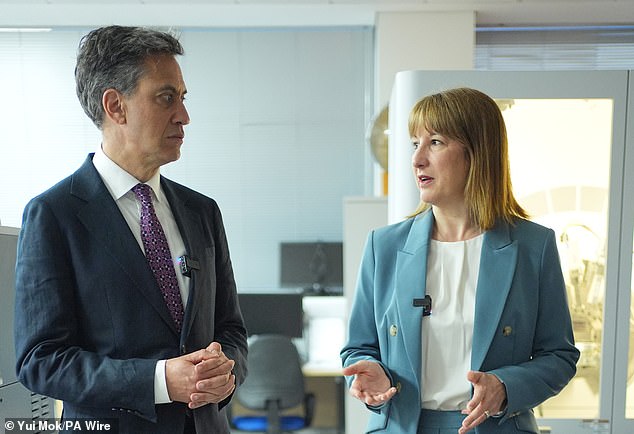
Chancellor Rachel Reeves and Energy Secretary Ed Miliband at the Materials Laboratory at the Royal School of Mines in Imperial College London today for the Sizewell C announcement
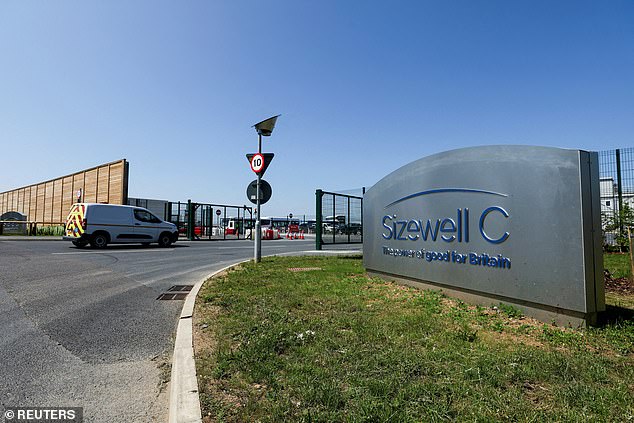
The construction site entrance to the Sizewell C nuclear power plant in Suffolk on June 11
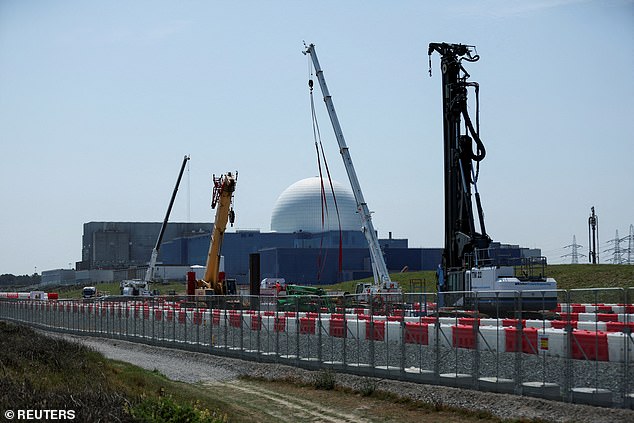
Construction works on the site of the new Sizewell C nuclear power plant in Suffolk on June 11
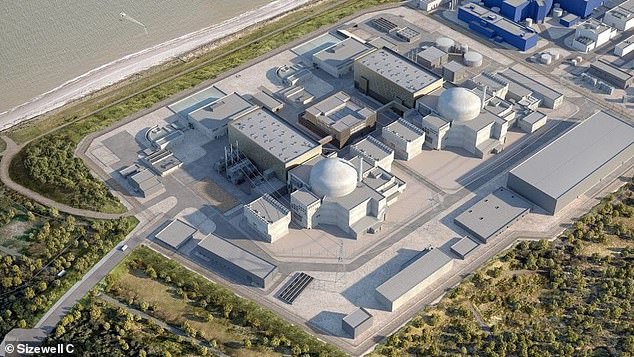
An artist’s impression of how the new Sizewell C nuclear power plant will looks once built
It also confirms the cost of Sizewell C’s construction, which is nearly double a previous forecast of about £20billion by developer EDF five years ago.
An average of £1 will be added to each household’s energy bills per month from autumn, over the duration of the construction phase.
Once Sizewell C is up and running, it is expected to create savings of up to £2billion a year across the future low-carbon electricity system.
The Government did not confirm how much individual households are estimated to save from the cheaper clean electricity.
DESNZ said the cost is about 20 per cent cheaper than the development of the Hinkley Point C nuclear power station in Somerset – which is under construction and projected to open in 2031.
Sizewell C will power the equivalent of six million homes and create some 10,000 jobs once it is operational, which is expected to be in the 2030s.
Mr Miliband said: ‘It is time to do big things and build big projects in this country again – and today we announce an investment that will provide clean, homegrown power to millions of homes for generations to come.
‘This government is making the investment needed to deliver a new golden age of nuclear, so we can end delays and free us from the ravages of the global fossil fuel markets to bring bills down for good.’
Chancellor Rachel Reeves said the development would reduce the UK’s reliance on ‘foreign dictators’ for energy.
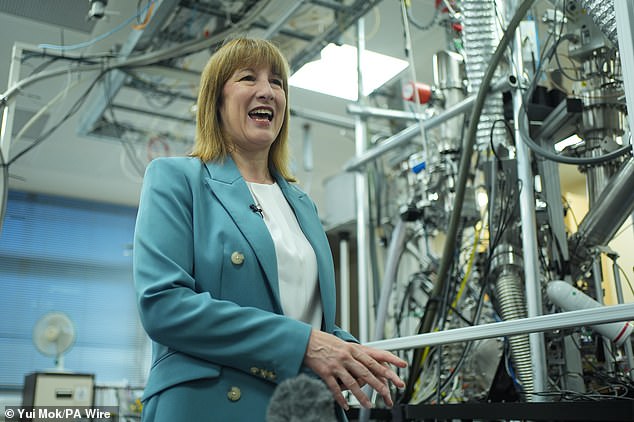
Chancellor of the Exchequer Rachel Reeves during a visit to Imperial College London today
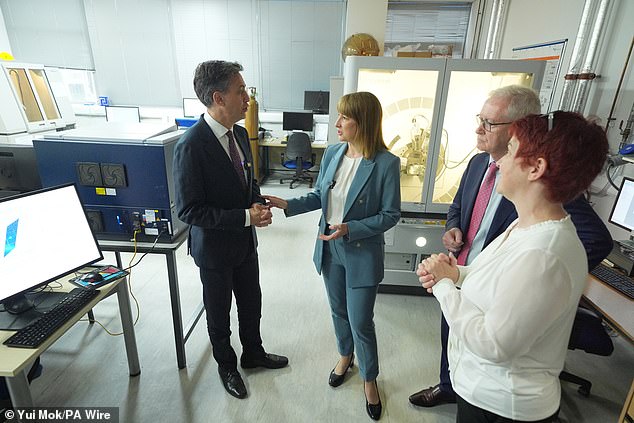
Rachel Reeves and Ed Miliband stand today next to Professor Hugh Brady, president of Imperial College London, and Professor Mary Ryan, Vice Provost for Research and Enterprise
‘This is a public-private consortium. We as a Government are putting in money but that means that government – taxpayers – will get a return on that investment,’ she said.
Ms Reeves added: ‘La Caisse, Centrica and Amber’s multibillion-pound investment is a powerful endorsement of the UK as the best place to do business and as a global hub for nuclear energy.
‘Delivering next generation, publicly owned clean power is vital to our energy security and growth, which is why we backed Sizewell C.’
Nuclear plants are seen as increasingly important electricity sources as the Government tries to decarbonise Britain’s grid by 2030, replacing fossil fuels with green power.
However, the last time Britain completed one was in 1987, which was the Sizewell B plant.
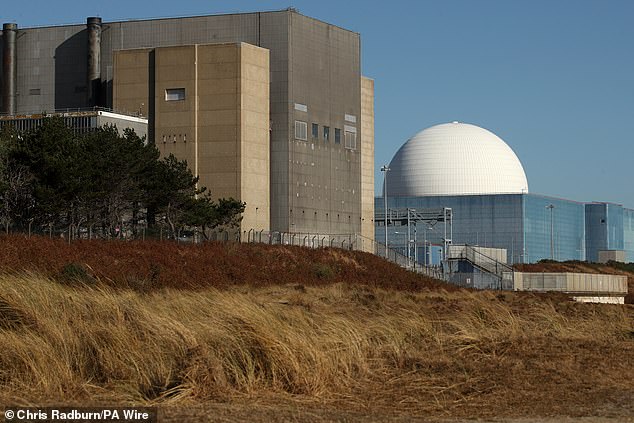
EDF’s Sizewell B nuclear power station in Suffolk is pictured in 2022
Chris O’Shea, Centrica’s chief executive, said Sizewell C was a ‘compelling investment for our shareholders and the country as a whole’.
‘This isn’t just an investment in a new power station – it’s an investment in Britain’s energy independence, our net zero journey, and thousands of high-quality jobs across the country,’ he added.
Russ Mould, investment director at AJ Bell, said: ‘Centrica’s shares got a boost after it announced a deal to buy a 15 per cent stake in the Sizewell C nuclear plant.
‘The company called it a ‘compelling investment’ for shareholders and the UK, and the market certainly likes the fact it is playing a major role in this important energy generating asset.
‘The overall cost of the project is another matter. Sizewell C might generate a significant amount of jobs and generate enough energy to power six million homes, yet its overall cost has nearly doubled from the previous estimate to now stand at £38billion.’












